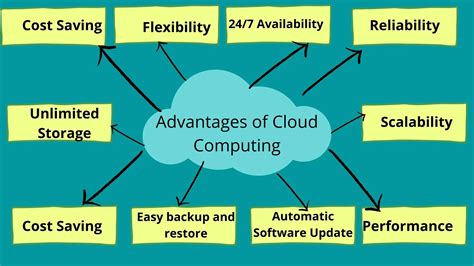Breaking News


Popular News


Discover how cloud computing is transforming data storage with enhanced security, scalability, cost-effectiveness, and accessibility for better data management.In today’s digital age, the way we store and manage data has undergone a remarkable transformation with the advent of cloud computing. This revolutionary technology has redefined the way businesses and individuals store, access, and collaborate on data. In this blog post, we will explore the various aspects of how cloud computing is revolutionizing data storage. From the introduction to cloud computing and its fundamental principles to the scalability, flexibility, and cost-effectiveness of cloud storage solutions, we will delve into the numerous benefits it offers. Additionally, we will discuss the enhanced security measures in cloud data storage and how it has changed the landscape of data management. Furthermore, we will also touch upon the accessibility and collaboration features of cloud storage and how they have transformed the way we work with data. Join us as we unravel the impact of cloud computing on data management and delve into the future of data storage.
Contents

Cloud computing is an innovative technology that has revolutionized the way data is stored, processed, and accessed. It involves the delivery of computing services, including servers, storage, databases, networking, software, and analytics, over the internet, also known as the cloud. This model offers on-demand access to shared pool of configurable computing resources which can be rapidly provisioned and released with minimal management effort.
With cloud computing, organizations can avoid upfront infrastructure costs and focus on projects that differentiate their businesses instead of managing infrastructure. It provides the ability to scale elastically to meet the changing demands and to innovate faster because resources are accessed within minutes and in a matter of just few clicks.
Furthermore, cloud computing enables users to access applications and data from any device connected to the internet, making it easier to collaborate and work remotely. It has become an essential component for businesses looking to stay competitive in today’s fast-paced digital world.

Scalability and Flexibility of Cloud Storage
One of the key advantages of cloud storage is its scalability. With traditional data storage solutions, businesses often face the challenge of running out of storage space and having to invest in additional hardware and infrastructure. However, with cloud storage, businesses can easily scale their storage needs up or down based on their requirements. This means that they only need to pay for the storage they actually use, making it a cost-effective solution for businesses of all sizes.
Moreover, cloud storage offers unparalleled flexibility. Businesses can access their data from anywhere, at any time, and from any device with an internet connection. This allows for seamless collaboration among team members, even if they are located in different geographic locations. Additionally, businesses have the flexibility to choose the type of storage that best suits their needs, whether it’s object storage for unstructured data or block storage for more structured data.
Furthermore, cloud storage providers offer a range of storage options and features, allowing businesses to customize their storage solutions to meet their specific requirements. This can include features such as automated data backup, data encryption, and data recovery, providing businesses with peace of mind knowing that their data is safe, secure, and easily accessible.
In conclusion, the scalability and flexibility of cloud storage are transforming the way businesses manage their data. With the ability to scale storage resources as needed and the flexibility to access data from anywhere, businesses can streamline their operations, enhance collaboration, and reduce costs, making cloud storage a vital tool in today’s digital age.

Cloud storage solutions have revolutionized the way businesses store and manage their data. One of the key advantages of using cloud storage is its cost-effectiveness. Unlike traditional data storage methods, where businesses had to invest in expensive infrastructure and hardware, cloud storage allows them to pay for only the storage they need. This pay-as-you-go model helps businesses save money by eliminating the need for upfront capital investment in hardware and maintenance costs.
Additionally, cloud storage providers often offer flexible pricing plans that allow businesses to scale their storage needs up or down based on their requirements. This scalability not only helps in reducing costs but also ensures that businesses are not paying for unused storage capacity. This flexibility in pricing makes cloud storage solutions an attractive option for businesses of all sizes.
Furthermore, the cost-effectiveness of cloud storage extends beyond just storage costs. With traditional storage methods, businesses had to bear the additional costs of data backup, maintenance, and security. However, cloud storage providers take care of these aspects, thereby reducing the overall cost of data storage for businesses. This means that businesses can redirect the resources saved from these areas to other strategic initiatives.
| Traditional Storage | Cloud Storage |
|---|---|
| High upfront investment in hardware | Pay-as-you-go model, no upfront investment |
| Fixed storage capacity | Flexible storage options, pay for what you use |
| Additional costs for backup and maintenance | Included backup, maintenance, and security |
In conclusion, the cost-effectiveness of cloud storage solutions is a significant factor driving businesses to adopt this technology. By providing a pay-as-you-go model, flexible pricing, and taking care of additional costs related to data storage, cloud storage solutions enable businesses to optimize their resources and focus on their core operations.

One of the major benefits of cloud data storage is the enhanced security it offers. With traditional on-premise storage solutions, the risk of physical theft or damage to hardware can result in the loss of important data. However, with cloud storage, data is stored in remote servers with robust security measures in place to protect against unauthorized access and potential threats. This includes encryption of data in transit and at rest, as well as multi-factor authentication to ensure only authorized users can access sensitive information.
Furthermore, cloud storage providers often have dedicated security teams and resources to continuously monitor and update their security protocols to stay ahead of evolving cyber threats. This proactive approach to security helps to provide peace of mind to businesses and individuals who rely on cloud storage for their data storage needs.
In addition, the use of virtual private networks (VPNs) and secure connections further enhances the security of data stored in the cloud. This means that even when accessing data from remote locations or over public networks, the risk of unauthorized interception or data breaches is significantly reduced.
Overall, the enhanced security features of cloud data storage make it an attractive option for businesses looking to safeguard their sensitive information and mitigate potential security risks associated with traditional storage methods.

One of the key benefits of cloud storage is the enhanced accessibility it offers to users. With traditional storage methods, accessing files and data often required physical access to a specific location or device. However, with cloud storage solutions, users can access their data from anywhere with an internet connection, making collaboration and data sharing much more convenient.
Furthermore, cloud storage allows for seamless collaboration among users. Team members can work on the same document simultaneously, eliminating the need to pass files back and forth through email or other communication channels. This real-time collaboration feature not only saves time but also ensures that everyone is working on the most up-to-date version of the document.
In addition to accessibility and collaboration, cloud storage also provides options for controlling and managing user permissions. Administrators can easily grant or restrict access to specific files and folders, ensuring that sensitive information remains secure while still allowing for seamless collaboration.
| Pros of Cloud Storage Accessibility and Collaboration | Cons of Cloud Storage Accessibility and Collaboration |
|---|---|
|
|

Cloud computing has brought about a significant revolution in the way data is managed and stored. With the advent of cloud computing, businesses now have the capability to store and manage vast amounts of data without the need for on-site physical servers. This has led to a massive shift in the way data management is approached, as businesses now have the ability to access, store, and manage their data more efficiently and effectively than ever before.
One of the key benefits of cloud computing in relation to data management is the scalability it offers. With traditional on-site servers, businesses often face limitations in terms of storage capacity. However, with cloud storage solutions, companies can easily scale their storage needs up or down as required, ensuring they have the right amount of storage space without the need to invest in additional hardware.
In addition to scalability, cost-effectiveness is also a major advantage of cloud computing for data management. By leveraging the cloud, businesses can avoid the upfront costs associated with purchasing and maintaining physical servers. This not only reduces capital expenditure but also minimizes ongoing maintenance and operating costs, making the overall cost of data management significantly lower.
Furthermore, another critical impact of cloud computing on data management is the enhanced security it provides. With data breaches on the rise, security is a top concern for businesses. Cloud storage solutions offer advanced security features such as encryption, identity and access management, and regular security updates, ensuring that data is protected from unauthorized access and cyber threats.

What is cloud computing?
Cloud computing is the delivery of computing services—including servers, storage, databases, networking, software, and more—over the Internet.
How does cloud computing revolutionize data storage?
Cloud computing revolutionizes data storage by providing scalable and flexible storage options, allowing businesses to easily expand or reduce their storage capacity as needed.
What are the benefits of using cloud computing for data storage?
Some benefits of using cloud computing for data storage include cost savings, accessibility, automated backups, and enhanced security measures.
What are some popular cloud storage providers?
Popular cloud storage providers include Amazon Web Services (AWS), Microsoft Azure, Google Cloud, and Dropbox.
Is cloud computing suitable for all types of businesses?
Cloud computing can benefit businesses of all sizes, from small startups to large enterprises, by providing a cost-effective solution for data storage and management.
What are the potential challenges of using cloud computing for data storage?
Challenges of using cloud computing for data storage may include data security concerns, potential downtime, and data transfer speeds.
How can businesses ensure the security of their data in the cloud?
Businesses can ensure the security of their data in the cloud by implementing encryption, access controls, regular security audits, and choosing reputable cloud service providers.